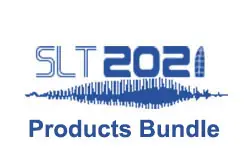An Exploration Of Log-Mel Spectrogram And Mfcc Features For Alzheimers Dementia Recognition From Spontaneous Speechan Exploration Of Log-Mel Spectrogram And Mfcc Features For Alzheimers Dementia Recognition From Spontaneous Speech
Amit Meghanani, Anoop C. S., Ramakrishnan A. G.
-
Members: FreeSPS
IEEE Members: $11.00
Non-members: $15.00Length: 0:15:21
19 Jan 2021
In this work, we explore the effectiveness of log-Mel spectrogram and MFCC features for Alzheimer's dementia (AD) recognition on ADReSS challenge dataset. We use three different deep neural networks (DNN) for AD recognition and mini-mental state examination (MMSE) score prediction: (i) convolutional neural network followed by a long-short term memory network (CNN-LSTM), (ii) pre-trained ResNet18 network followed by LSTM (ResNet-LSTM), and (iii) pyramidal bidirectional LSTM followed by a CNN (pBLSTM-CNN). CNN-LSTM achieves an accuracy of 64.58\% with MFCC features and ResNet-LSTM achieves an accuracy of 62.5\% using log-Mel spectrograms. pBLSTM-CNN and ResNet-LSTM models achieve root mean square errors (RMSE) of 5.9 and 5.98 in the MMSE score prediction, using the log-Mel spectrograms. Our results beat the baseline accuracy (62.5\%) and RMSE (6.14) reported for acoustic features on ADReSS challenge dataset. The results suggest that log-Mel spectrograms and MFCCs are effective features for AD recognition problem when used with DNN models.



